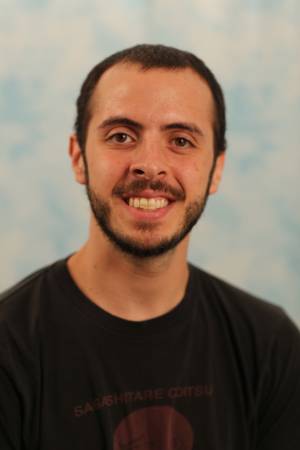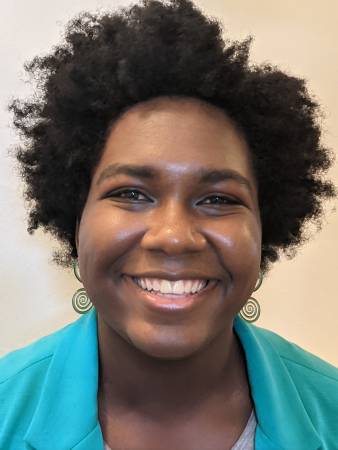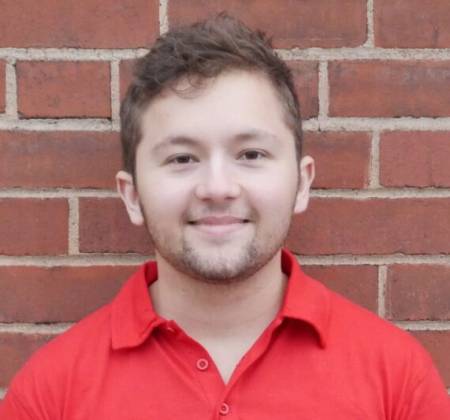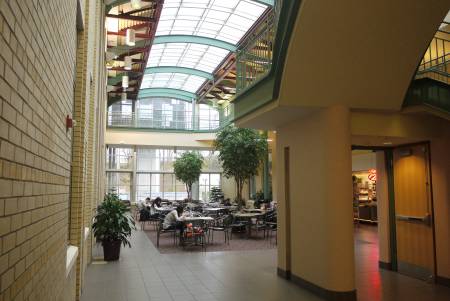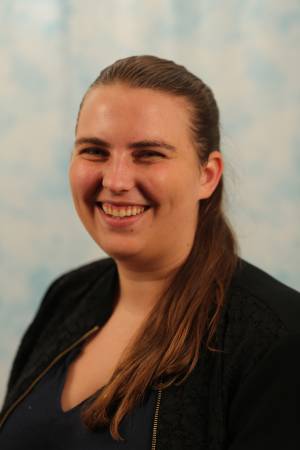MSR Thesis Talk: Tarasha Khurana
Title: Detecting Invisible People Abstract: Monocular object detection and tracking have improved drastically in recent years, but rely on a key assumption: that objects are visible to the camera. Many offline tracking approaches reason about occluded objects post-hoc, by linking together tracklets after the object re-appears, making use of reidentification (ReID). However, online tracking [...]
Carnegie Mellon University
MSR Thesis Talk: Sujay Bajracharya
work, we address the problem of goal-directed cloth manipulation, a challenging task due to the deformability of cloth. Our insight is that optical flow, a technique normally used for motion estimation in video, can also provide an effective representation for corresponding cloth poses across observation and goal images. We introduce FabricFlowNet (FFN), a cloth manipulation [...]
Carnegie Mellon University
MSR Thesis Talk: Edward Chen
Title: Towards Practical Ultrasound AI Across Real-World Patient Diversity Abstract: In the case of high-tempo, traumatic scenarios on the battlefield, real-time ultrasound (US) imaging serves as an enabler for countless possible robotic interventions. Having the ability to automatically segment anatomical landmarks in the body, such as arteries, veins, ligaments, and veins, for percutaneous procedures remains [...]
Carnegie Mellon University
MSR Thesis Talk: Haochen Wang
Title: Audiovisual ontology and robust representations via cross-modal fusion Abstract: The shrill of an ambulance siren and flashing lights, the hum of an accelerating car — important events often come to us simultaneously through sight and sound. We first consider the problem of identifying these events from raw, unlabeled audiovisual data of agents interacting with [...]
Social Navigation with Pedestrian Groups
Abstract: Autonomous navigation in human crowds (i.e., social navigation) presents several challenges: The robot often needs to rely on its noisy sensors to identify and localize the pedestrians in human crowds; The robot needs plan efficient paths to reach its goals; The robot needs to do so in a safe and socially appropriate manner. In [...]
Carnegie Mellon University
MSR Thesis Talk: Viraj Parimi
Title: T-HTN: Timeline Based HTN Planning for Multi-Agent Robots Abstract: Planning in mission-critical systems like deep-space habitats with onboard robotic systems must be robust to unforeseen circumstances. Such systems are expected to complete a set of goals with different deadlines each day for routine maintenance while also accounting for emergencies. With the presence of [...]
Carnegie Mellon University
Robust and Scalable Perception For Autonomy
Abstract: Autonomous mobile robots have the potential to drastically improve the quality of our daily life. For example, self-driving vehicles could make transportation safer and more affordable. To navigate complex environments, such robots need a perception system that translates raw sensory data to high-level understanding. This thesis focuses on two fundamental challenges in learning such [...]
Carnegie Mellon University
MSR Thesis Talk: Yiming Zuo
Title: Towards Self-supervised Object Discovery and Tracking Abstract: Object discovery and multiple object tracking (MOT) are two highly interrelated tasks that are known to be fundamental problems in computer vision, and are crucial for video understanding. Most existing methods rely on supervised training with human annotations, which is laborious and expensive. In this thesis, [...]
Carnegie Mellon University
MSR Thesis Talk: Qiao Gu
Title: Towards Object-generic 6D Pose Estimation Abstract: Pose estimation is a basic module in many robot manipulation pipelines. Estimating the pose of objects in the environment can be useful for grasping, motion planning, or manipulation. However, current state-of-the-art methods for pose estimation either rely on large annotated training sets or simulated data. Further, the long [...]
Carnegie Mellon University
MSR Thesis Talk: Divam Gupta
Title: End-to-End Deep Stereo Layout Estimation Abstract: Accurate layout estimation is crucial for planning and navigation in robotics applications, such as self-driving. In this paper, we introduce the Stereo Bird's Eye ViewNetwork (SBEVNet), a novel supervised end-to-end framework for estimation of bird's eye view layout from a pair of stereo images. Although our network [...]
Carnegie Mellon University
Michael Tasota – MSR Thesis Talk
Title: Design of a Multimodal System for Social Emotional Learning in Early Childhood Classrooms Abstract: As the prevalence of mobile and touch-based devices continues to expand in society, so too does its impact on young children. With educational technologies also on the rise, young children benefit most from those technologies that are designed to [...]
Carnegie Mellon University
MSR Thesis Talk: Aaron Huang
Title: End-to-End Methods for Autonomous Driving in Simulation Abstract: Fully autonomous driving is considered one of the grand challenges of modern technology and a variety of approaches have emerged for creating and evaluating autonomous driving agents. The self-driving industry typically adopts a modular software architecture and uses large fleets of autonomous vehicles for data [...]
Carnegie Mellon University
MSR Thesis Talk
Title: Retrieval-based Novel Activity Detection in Untrimmed Videos Abstract: Accurately detecting activities in untrimmed videos is a challenging task as systems need to handle variance in object scales, multiple viewpoints, and multiple types of activities. Furthermore, in a real-world scenario, activity detectors are often required to detect novel kinds of activities when the need [...]
Carnegie Mellon University
Semantic Mapping for Autonomous Navigation and Exploration
Abstract: The last two decades have seen enormous progress in the sensors and algorithms for 3D perception, giving robots the means to build accurate spatial maps and localize themselves in them in real time. The geometric information in these maps is invaluable for navigation while avoiding obstacles, but insufficient, by itself, for robots to robustly [...]
Carnegie Mellon University
MSR Thesis Talk: Howard Coffin
Title: Mutual Information Maps for Single and Multi-Target Ergodic Search Abstract: This thesis addresses use of multi-agent systems to perform autonomous search for moving targets. Target search has many applications, including search and rescue and surveillance, but most robotic systems used in these situations require human operators. Recent works have used ergodic search methods to [...]
Carnegie Mellon University
MSR Thesis Talk: Wanwen Chen
Title: Ultrasound-based Needle Tracking and Lateral Manipulation Planning for Common Needle Steering Abstract: Many medical interventions require inserting a needle towards the desired site. Robotic needle insertion can potentially provide reliable needle access independent of practitioner experience and availability. However, when the needle is inserted into heterogeneous tissue, the complicated needle-tissue interaction introduces multiple challenges [...]
Carnegie Mellon University
MSR Thesis Talk: Rohit Garg
Title: Coordinated Aerial Exploration of Subterranean Voids Abstract: Subterranean exploration has been thrust into the spotlight by the recent DARPA Subterranean Challenge. Teams are tasked with developing a multi-agent system that can rapidly navigate through unknown underground environments while sending back maps and other semantic information. A system with such capabilities has a wide [...]
Carnegie Mellon University
MSR Thesis Talk: Harvey Shi
Title: The design of a compact laser scanner and an integrated simulation environment for smart manufacturing Abstract: Advanced manufacturing is on the rise with the notable progress in the additive and hybrid manufacturing field. However, most of the existing solutions are open loop without sensory feedback because of the lack of a small form factor [...]
Carnegie Mellon University
MSR Thesis Talk: Daqian Cheng
Zoom link: https://cmu.zoom.us/j/99726348928?pwd=azlicW9qZk1Nc3BkQXBLT2d6djVBQT09 Meeting ID: 997 2634 8928 Passcode: 136122 Title: SLAM with Laser Profilers for High Definition Mapping in Confined Spaces Abstract: Three-dimensional reconstruction in confined spaces is important for the manufacturing of aircraft wings, the inspection of narrow pipes, the examination of turbine blades, etc. It is also challenging because confined spaces tend [...]
Carnegie Mellon University
MSR Thesis Talk: Quint Hester
Title: Graph Neural Networks for Wind Farm Yaw Optimization Abstract: In order to mitigate the effects of climate change, it is important to maximize the power output of our wind energy resources. Wind farm control is typically greedy, with all turbines facing directly into the wind. Due to wake interactions, this leads to reductions [...]
Carnegie Mellon University
MSR Thesis Talk: Henry Zhang
Title: On Visual-Aided LiDAR-Inertial Odometry System in Challenging Subterranean Environments Abstract: Simultaneous Localization and Mapping (SLAM) is one of the fundamental components for autonomous robotic exploration. The goal of SLAM is to create an accurate map for the environment and provide robust state estimation for planning, control, and perception tasks. However, due to the [...]
Carnegie Mellon University
Efficient Robot Decision-Making for Achieving Multiple Independent Tasks
Abstract: We focus on robotics applications where a robot is required to accomplish a set of tasks that are partially observable and evolve independently of each other according to their dynamics. One such domain that we target in this work is decision-making for a robot waiter waiting tables at a restaurant. The robot waiter should [...]
MSR Thesis Talk: Ryan Darnley
Title: Communication Network Flow Control With LQR and Factor Graphs Abstract: Advances in the estimation and more recently the controls communities have leveraged the use of factor graphs to overcome problems of scalability and runtime in dynamical systems. In continuation of that work, we look to use factor graphs to perform LQR control on [...]
Carnegie Mellon University
MSR Thesis Talk: Shirsendu Halder
Title: Robust 3D reconstruction in noisy environments Abstract: Automated inspection in industrial manufacturing can minimize the total production cost of a part. Current inspection solutions often involve measuring a part manually, which interrupts the machining process. We present two non-contact real-time systems which integrate visual inspection in-line with CNC (computer numerical control) machines and ensures [...]
MSR Thesis Talk: Tejus Gupta
ZOOM Link: https://cmu.zoom.us/j/2388465851 Meeting ID: 238 846 5851 Google calendar invite link Title: Adaptive and Efficient Models for Intent Recognition Abstract: Assistive robots should have the ability to understand the intent of humans, predict their behavior, and plan to provide anticipatory assistance in complex real-life environments. In this thesis, we present adaptive and efficient algorithms for recognizing [...]
Carnegie Mellon University
MSR Thesis Talk: Siddharth Agrawal
Title: Learning to Imitate, Adapt and Communicate Abstract: For AI agents to co-exist with humans, they need to be able to learn from us humans, adapt to any perceived changes in our behavior, and communicate in a manner that is easily interpretable. In this work, we investigate the following 3 subproblems: Imitation Learning, Adaptation in Human-Agent [...]
Carnegie Mellon University
MSR Thesis Talk: Danny Vedova
Link: https://cmu.zoom.us/j/92810207130?pwd=blphbkovYVA2b1VoSmhuZ0h2bFRzZz09 Meeting ID: 928 1020 7130 Passcode: 721620 Title: Design and Analysis of a Control Pipeline for a Manipulator in Space Abstract: Many satellites are rapidly reaching the end of their lifespans, and risk de-orbiting if no action is taken. One common problem satellites face towards the end of their lifespans is that they are running [...]
Carnegie Mellon University
MSR Thesis Talk: Fan Jia
Zoom Link: https://cmu.zoom.us/j/9793644214?pwd=enpab3dPc0FBWVdqWDNrcVlabUJCZz09 Meeting ID: 979 364 4214 Passcode: 304453 Title: Trust-Aware Behavior Reflection for Robot Swarm Self-Healing Abstract: The deployment of robot swarms is influenced by real-world factors, such as motor issues, sensor failure, and wind disturbances. These factors cause the appearance of faulty robots. In a decentralized swarm, sharing incorrect information from faulty robots will lead to [...]
Carnegie Mellon University
MSR Thesis Talk: Tejas Zodage
Meeting Link: https://cmu.zoom.us/j/2427727031 Title: Point Cloud Registration as a Classification Problem Abstract: Point Cloud Registration(PCR) is an important step in fields such as robotic manipulation, augmented and virtual reality, SLAM, etc. In the context of computer vision, registration, in general, refers to the process of aligning data obtained from different frames, and as the [...]
Carnegie Mellon University
Decentralized Navigation of Quadrotor Teams in Uncertain Workspaces
Abstract: A fundamental requirement for realizing scalable and responsive real-world multi-robot systems for time-sensitive critical applications such as search and rescue or building clearance is a motion-planning and coordination framework that exhibits three essential properties. The first property is safety that encompasses aspects relating to kinodynamic feasibility and collision-avoidance. The second property is reliability that [...]
Control of Robots with Nonstationary Dynamics
Abstract: Robots can be constructed with fewer resources and less strict constraints than is generally believed. Soft robots can be constructed with very few parts and from a wide variety of materials. This makes them a potentially appealing choice for applications where there are resource constraints on system fabrication. However, soft robot dynamics are difficult [...]
Carnegie Mellon University
Bayesian Models for Science-Driven Robotic Exploration
Abstract Planetary rovers allow for science investigations at remote locations. They have traversed many kilometers and made major scientific discoveries. However, rovers spend a considerable amount of time awaiting instructions from mission control. The reason is that they are designed for highly supervised data collection, not for autonomous exploration. The exploration of farther worlds will [...]
Open Challenges in Sign Language Translation & Production
Abstract: Machine translation and computer vision have greatly benefited of the advances in deep learning. The large and diverse amount of textual and visual data have been used to train neural networks whether in a supervised or self-supervised manner. Nevertheless, the convergence of the two field in sign language translation and production is still poses [...]
The Search for Ancient Life on Mars Began with a Safe Landing
Abstract: Prior mars rover missions have all landed in flat and smooth regions, but for the Mars 2020 mission, which is seeking signs of ancient life, this was no longer acceptable. To maximize the variety of rock samples that will eventually be returned to earth for analysis, the Perseverance rover needed to land in a [...]
Meshlet Primitives for Dense RGB-D SLAM in Dynamic Environments
Abstract: Dense RGB-D SLAM has been well established as a method for achieving robust localization while providing high quality dense surface reconstruction. However, despite significant progress, dense RGB-D SLAM has remained difficult to achieve on computationally constrained platforms, such as those used on autonomous aerial vehicles. A significant limiting factor in the current state of [...]
3D Recognition with self-supervised learning and generic architectures
Abstract: Supervised learning relies on manual labeling which scales poorly with the number of tasks and data. Manual labeling is especially cumbersome for 3D recognition tasks such as detection and segmentation and thus most 3D datasets are surprisingly small compared to image or video datasets. 3D recognition methods are also fragmented based on the type [...]
Carnegie Mellon University
Heuristics for routing and scheduling of Spatio-temporal type problems in industrial environments
Abstract: Spatio-temporal problems are fairly common in industrial environments. In practice, these problems come with different characteristics and are often very hard to solve optimally. So, practitioners prefer to develop heuristics that exploit mathematical structure specific to the problem for obtaining good performance. In this thesis, we will present work on heuristics for 3 different [...]
Computational Light Transport with Interferometry
Abstract: Optical interferometry is the measurement of small, sub-wavelength distances by exploiting the wave nature of light. Due to its capability to resolve micron-scale displacements, it has found widespread applications in biomedical imaging, industrial fabrication, physics, and astrophysics. In this thesis, we introduce a set of techniques we call computational interferometry, that bring the benefits [...]
Rapid Adaptation for Robot Learning
Abstract: How can we train a robot to generalize to diverse environments? This question underscores the holy grail of robot learning research because it is difficult to supervise an agent for all possible situations it can encounter in the future. We posit that the only way to guarantee such a generalization is to continually learn and [...]
Carnegie Mellon University
3D Reconstruction using Differential Imaging
Abstract: 3D reconstruction has been at the core of many computer vision applications, including autonomous driving, visual inspection in manufacturing, and augmented and virtual reality (AR/VR). Despite the tremendous progress made over the years, there remain challenging open-research problems. This thesis addresses three such problems in 3D reconstruction. First, we address the problem of defocus [...]
Robotic Cave Exploration for Search, Science, and Survey
Abstract: Robotic cave exploration has the potential to create significant societal impact through facilitating search and rescue, in the fight against antibiotic resistance (science), and via mapping (survey). But many state-of-the-art approaches for active perception and autonomy in subterranean environments rely on disparate perceptual pipelines (e.g., pose estimation, occupancy modeling, hazard detection) that process the same underlying sensor data in [...]
Humans, hands, and horses: 3D reconstruction of articulated object categories using strong, weak, and self-supervision
Abstract: Reconstructing 3D objects from a single 2D image is a task that humans perform effortlessly, yet computer vision so far has only robustly solved 3D face reconstruction. In this talk we will see how we can extend the scope of monocular 3D reconstruction to more challenging, articulated categories such as human bodies, hands and [...]
Enabling Grounded Language Communication for Human-Robot Teaming
Abstract: The ability for robots to effectively understand natural language instructions and convey information about their observations and interactions with the physical world is highly dependent on the sophistication and fidelity of the robot’s representations of language, environment, and actions. As we progress towards more intelligent systems that perform a wider range of tasks in a [...]
Looking behind the Seen in Order to Anticipate
Abstract: Despite significant recent progress in computer vision and machine learning, personalized autonomous agents often still don’t participate robustly and safely across tasks in our environment. We think this is largely because they lack an ability to anticipate, which in turn is due to a missing understanding about what is happening behind the seen, i.e., [...]
Robots that Learn through Language
Abstract: Advances in perception have been integral to transitioning robots from machines restricted to factory automation to autonomous agents that operate robustly in unstructured environments. As our surrogates, robots enable people to explore the deepest depths of the ocean and distant regions of space, making discoveries that would otherwise be impossible. The age of robots [...]
Towards Reconstructing Any Object in 3D
Abstract: The world we live in is incredibly diverse, comprising of over 10k natural and man-made object categories. While the computer vision community has made impressive progress in classifying images from such diverse categories, the state-of-the-art 3D prediction systems are still limited to merely tens of object classes. A key reason for this stark difference [...]
Carnegie Mellon University
Beyond rigid objects: Data-driven Methods for Manipulation of Deformable Objects
Abstract: Manipulation of deformable objects challenges common assumptions made for rigid objects. Deformable objects have high intrinsic state representation and complex dynamics with high degrees of freedom, making it difficult for state estimation and planning. The completed work can be divided into two parts. In the first part, we explore reinforcement learning (RL) as a [...]
Carnegie Mellon University
Simulation, Perception, and Generation of Human Behavior
Abstract: Understanding and modeling human behavior is fundamental to almost any computer vision and robotics applications that involve humans. In this thesis, we take a holistic approach to human behavior modeling and tackle its three essential aspects --- simulation, perception, and generation. Throughout this thesis, we show how the three aspects are deeply connected and [...]
The Clinician’s AI Partner: Augmenting Clinician Capabilities Across the Spectrum of Healthcare
Abstract: Clinicians often work under highly demanding conditions to deliver complex care to patients. As our aging population grows and care becomes increasingly complex, physicians and nurses are now also experiencing feelings of burnout at unprecedented levels. In this talk, I will discuss possibilities for computer vision to function as a partner to clinicians, and to augment their capabilities, across [...]
The Unusual Effectiveness of Abstractions for Assistive AI
Abstract: Can we balance efficiency and reliability while designing assistive AI systems? What would such AI systems need to provide? In this talk I will present some of our recent work addressing these questions. In particular, I will show that a few fundamental principles of abstraction are surprisingly effective in designing efficient and reliable AI [...]
Reliable and Accessible Visual Recognition
Abstract: As visual recognition models are developed across diverse applications; we need the ability to reliably deploy our systems in a variety of environments. At the same time, visual models tend to be trained and evaluated on a static set of curated and annotated data which only represents a subset of the world. In this [...]
Fake It Till You Make It: Face analysis in the wild using synthetic data alone
Abstract: In this seminar I will demonstrate how synthetic data alone can be used to perform face-related computer vision in the wild. The community has long enjoyed the benefits of synthesizing training data with graphics, but the domain gap between real and synthetic data has remained a problem, especially for human faces. Researchers have tried [...]
Carnegie Mellon University
Structured Learning for Robust Robot Manipulation
Abstract: Robust and generalizable robots that can autonomously manipulate objects in semi-structured environments can bring material benefits to society. Data-driven learning approaches are crucial for enabling such systems by identifying and exploiting patterns in semi-structured environments, allowing robots to adapt to novel scenarios with minimal human supervision. However, despite significant prior work in learning for [...]
Robotics and Warehouse Automation at Berkshire Grey
Abstract: This talk tells the Berkshire Grey story, from its founding in 2013 to its IPO earlier this year — the first robotics IPO since iRobot over15 years ago. Berkshire Grey produces automated systems for e-commerce order fulfillment, parcel sortation, store replenishment, and related operations in warehouses, distribution centers, and in the back ends of [...]
An Experimental Design Perspective on Model-Based Reinforcement Learning
Abstract: In many practical applications of RL, it is expensive to observe state transitions from the environment. For example, in the problem of plasma control for nuclear fusion, computing the next state for a given state-action pair requires querying an expensive transition function which can lead to many hours of computer simulation or dollars of [...]
Learning Model Preconditions for Planning with Multiple Models
Abstract: Different models can provide differing levels of fidelity when a robot is planning. Analytical models are often fast to evaluate but only work in limited ranges of conditions. Meanwhile, physics simulators are effective at modeling complex interactions between objects but are typically more computationally expensive. Learning when to switch between the various models can [...]
Leveraging StyleGAN for Image Editing and Manipulation
Abstract: StyleGAN has recently been established as the state-of-the-art unconditional generator, synthesizing images of phenomenal realism and fidelity, particularly for human faces. With its rich semantic space, many works have attempted to understand and control StyleGAN’s latent representations with the goal of performing image manipulations. To perform manipulations on real images, however, one must learn to [...]
Resilient Exploration in SubT Environments: Team Explorer’s Approach and Lessons Learned in the Final Event
Abstract: Subterranean robot exploration is difficult with many mobility, communications, and navigation challenges that require an approach with a diverse set of systems, and reliable autonomy. While prior work has demonstrated partial successes in addressing the problem, here we convey a comprehensive approach to address the problem of subterranean exploration in a wide range of [...]
Simulation-based Planning for Pick-and-Place in Heavy Clutter using Non-prehensile Manipulation
Abstract: Robot manipulation in domestic households, industrial manufacturing and warehouses might require contact-rich interactions with objects in the environment. For pick-and-place style grasping tasks in cluttered scenes, it can be more economical for the robot to rely on non-prehensile actions vis-à-vis deliberate prehensile rearrangement. Non-prehensile actions also let the robot manipulate large and bulky objects [...]
Carnegie Mellon University
Relationships in instance segmentation and anomaly detection
Abstract: This thesis primarily covers work on two different tasks in computer vision: (1) anomaly detection and (2) instance segmentation. Anomaly detection is an underexplored unsupervised problem that has existed in many fields. On the other hand, instance (and panoptic) segmentation is a supervised problem that can leverage the powerful data and key developments from [...]
Next-Gen Video Communication
Abstract: Video communication connects our world. It is necessary in conducting business, educational and personal activities across different geographical locations. However, the quality of an average user’s video communication is dramatically worse than that of professionally created videos in news broadcasts, talk shows, and on YouTube. This is because professionally created videos are often captured with [...]
Carnegie Mellon University
Learning with Diverse Forms of Imperfect and Indirect Supervision
Abstract: High capacity Machine Learning (ML) models trained on large, annotated datasets have driven impressive advances in several fields including natural language processing and computer vision, in turn leading to impactful applications of ML in areas such as healthcare, e-commerce, and predictive maintenance. However, obtaining annotated datasets at the scale required for training such models [...]
MRSD Annual Poster Presentation
Four student teams from the MRSD program will use posters, videos, and hardware to show their project work on robots for room disinfection, search & rescue, increasing human capability via a third arm, and increased-efficiency factory-floor obstacle avoidance.
Carnegie Mellon University
3D Representation Learning for Perception and Prediction: A Modular Yet Highly Integrated Approach
Abstract: Modularized and cascaded autonomy stacks (object detection, then tracking and then trajectory prediction) have been widely adopted in many autonomous systems such as self-driving cars due to its interpretability. In this talk, I advocate the use of such a modular approach but improve its accuracy and robustness by developing different 3D representations for each [...]
Carnegie Mellon University
MSR Thesis Talk: Avi Rudich
Title: Kinematic Analysis of 3D Printed Flexible Delta Robots Abstract: Flexible Delta robots show significant promise for use in a wide array of manipulation tasks. They are simple to design and manufacture, and they maintain a high level of repeatability and precision in open loop control. This thesis analyzes the kinematic properties of flexible [...]
Reconstructing common objects to interact with
Abstract: We humans are able to understand 3D shapes of common daily objects and interact with them from a wide range of categories. We understand cups are usually cylinder-like and we can easily predict the shape of one particular cup, both in isolation or even when it is held by a human. We aim to [...]
Activity Understanding of Scripted Performances
Abstract: The PSU Taichi for Smart Health project has been doing a deep-dive into vision-based analysis of 24-form Yang-style Taichi (TaijiQuan). A key property of Taichi, shared by martial arts katas and prearranged form exercises in other sports, is practice of a scripted routine to build both mental and physical competence. The scripted nature of routines [...]
Carnegie Mellon University
Dynamical Model Learning and Inversion for Aggressive Quadrotor Flight
Abstract: Quadrotor applications have seen a surge recently and many tasks require precise and accurate controls. Flying fast is critical in many applications and the limited onboard power source makes completing tasks quickly even more important. Staying on a desired course while traveling at high speeds and high accelerations is difficult due to complex and [...]
Carnegie Mellon University
Person Transfers Between Multiple Service Robots
Abstract: As more service robots are deployed in the world, human-robot interaction will not be limited to one-to-one interactions between users and robots. Instead, users will likely have to interact with multiple robots, simultaneously or sequentially, throughout their day to receive services and complete different tasks. In this thesis, I describe work in which my [...]
A causal framework to diagnose and fix issues with doors
Abstract: Many animals, such as ravens, (and a fortiori humans) exhibit a great deal of physical intelligence that allows them to solve complex multi-step physical puzzles. This ability indicates an understanding or a faculty to represent causality and mechanisms, understand when something goes wrong, and figure out how to deal with it. As a step [...]
Carnegie Mellon University
Understanding Unbalanced Datasets Through Simple Models and Dataset Exploration
Abstract: Computer vision models have proven to be tremendously capable of recognizing and detecting several classes and objects. They succeed in classes widely ranging in type and scale from humans to cans to pens. However, the best performing classes have abundant examples in large-scale datasets today. In unbalanced datasets, where some categories are seen in [...]
Domain adaptive object detection
Abstract: Recent advances in deep learning have led to the development of accurate and efficient models for object detection. However, learning highly accurate models relies on the availability of large-scale annotated datasets. Due to this, model performance drops drastically when evaluated on label-scarce datasets having visually distinct images. Domain adaptation tries to mitigate this degradation. In [...]
Carnegie Mellon University
Understanding, Exploiting and Improving Inter-view Relationships
Abstract: Multi-view machine learning has garnered substantial attention in various applications over recent years. Many such applications involve learning on data obtained from multiple heterogeneous sources of information, for example, in multi-sensor systems such as self-driving cars, or monitoring intensive care patient vital signs at their bed-side. Learning models for such applications can often benefit [...]
Model-Centric Verification of Artificial Intelligence
Abstract: This work shows how provable guarantees can be used to supplement probabilistic estimates in the context of Artificial Intelligence (AI) systems. Statistical techniques measure the expected performance of a model, but low error rates say nothing about the ways in which errors manifest. Formal verification of model adherence to design specifications can yield certificates [...]
Designing Whisker Sensors to Detect Multiple Mechanical Stimuli for Robotic Applications
Abstract: Many mammals, such as rats and seals, use their whiskers as versatile mechanical sensors to gain precise information about their surroundings. Whisker-inspired sensors on robotic platforms have shown their potential benefit, improving applications ranging from drone navigation to texture mapping. Despite this, there is a gap between the engineered sensors and many of the [...]
Carnegie Mellon University
Human-in-the-loop Control of Mobile Robots
Abstract: Human-in-the-loop control for mobile robots is an important aspect of robot operation, especially for navigation in unstructured environments or in the case of unexpected events. However, traditional paradigms of human-in-the-loop control have relied heavily on the human to provide precise and accurate control inputs to the robot, or reduced the role of the human [...]
Visual Understanding across Semantic Groups, Domains and Devices
Abstract: Deep neural networks often lack generalization capabilities to accommodate changes in the input/output domain distributions and, therefore, are inherently limited by the restricted visual and semantic information contained in the original training set. In this talk, we argue the importance of the versatility of deep neural architectures and we explore it from various perspectives. [...]
Towards Robust Human-Robot Interaction: A Quality Diversity Approach
Abstract: The growth of scale and complexity of interactions between humans and robots highlights the need for new computational methods to automatically evaluate novel algorithms and applications. Exploring the diverse scenarios of interaction between humans and robots in simulation can improve understanding of complex human-robot interaction systems and avoid potentially costly failures in real-world settings. [...]
Carnegie Mellon University
Planning and Execution using Inaccurate Models with Provable Guarantees on Task Completeness
Abstract: Modern planning methods are effective in computing feasible and optimal plans for robotic tasks when given access to accurate dynamical models. However, robots operating in the real world often face situations that cannot be modeled perfectly before execution. Thus, we only have access to simplified but potentially inaccurate models. This imperfect modeling can lead [...]
Topology-Driven Learning for Biomedical Imaging Informatics
Abstract: Thanks to decades of technology development, we are now able to visualize in high quality complex biomedical structures such as neurons, vessels, trabeculae and breast tissues. We need innovative methods to fully exploit these structures, which encode important information about underlying biological mechanisms. In this talk, we explain how topology, i.e., connected components, handles, loops, [...]
Lessons from the Field: Deep Learning and Machine Perception for field robots
Abstract: Mobile robots now deliver vast amounts of sensor data from large unstructured environments. In attempting to process and interpret this data there are many unique challenges in bridging the gap between prerecorded data sets and the field. This talk will present recent work addressing the application of machine learning techniques to mobile robotic perception. [...]
Learning generative representations for image distributions
Abstract: Autoencoder neural networks are an unsupervised technique for learning representations, which have been used effectively in many data domains. While capable of generating data, autoencoders have been inferior to other models like Generative Adversarial Networks (GAN’s) in their ability to generate image data. We will describe a general autoencoder architecture that addresses this limitation, and [...]
Carnegie Mellon University
Self-Supervising Occlusions for Vision
Abstract: Virtually every scene has occlusions. Even a scene with a single object exhibits self-occlusions - a camera can only view one side of an object (left or right, front or back), or part of the object is outside the field of view. More complex occlusions occur when one or more objects block part(s) of [...]
Carnegie Mellon University
Development of an Agile and Dexterous Balancing Mobile Manipulator Robot
Abstract: This thesis focuses on designing and controlling a dynamically stable shape-accelerating dual-arm mobile manipulator, the Carnegie Mellon University (CMU) ballbot. The CMU ballbot is a human-sized dynamically stable mobile robot that balances on a single spherical wheel. We describe the development of a pair of seven-degree-of-freedom (DOF) humanoid arms. The new 7-DOF arm pair [...]
Carnegie Mellon University
Massively Parallelized Lazy Planning Algorithms
Abstract: Search-based planning algorithms enable autonomous agents like robots to come up with well-reasoned long horizon plans to achieve a given task objective. They do so by optimizing a task-specific cost function while respecting the constraints on either the agent (e.g. motion constraints) or the environment (e.g. obstacles). In robotics, such as in motion planning [...]
Building Intelligent and Visceral Machines: From Sensing to Application
Abstract: Humans have evolved to have highly adaptive behaviors that help us survive and thrive. As AI prompts a move from computing interfaces that are explicit and procedural to those that are implicit and intelligent, we are presented with extraordinary opportunities. In this talk, I will argue that understanding affective and behavioral signals presents many opportunities [...]
GANcraft – an unsupervised 3D neural method for world-to-world translation
Abstract: Advances in 2D image-to-image translation methods, such as SPADE/GauGAN, have enabled users to paint photorealistic images by drawing simple sketches similar to those created in Microsoft Paint. Despite these innovations, creating a realistic 3D scene remains a painstaking task, out of the reach of most people. It requires years of expertise, professional software, a library [...]
Run-Time Optimization in the Deep Learning Age
Abstract: In a recovery task one seeks to obtain an estimate of an unknown signal from a set of incomplete measurements. These problems arise in a number of computer vision applications, from image based tasks such as super-resolution and in-painting to 3D reconstruction tasks such as Non-Rigid Structure from Motion and scene flow estimation. Early [...]
Carnegie Mellon University
System Identification and Control of Multiagent Systems Through Interactions
Abstract: This thesis investigates the problem of identifying dynamics models of individual agents of a multiagent system (MAS) and exploiting these models to shape their behavior using robots extrinsic to the MAS. While task-based control of a MAS using onboard controllers of its agents is well studied, we investigate (a) how easy it is for [...]
Human-in-the-loop Model Creation
Abstract: Modern machine learning systems have made astonishing progress in automating labor-intensive tasks such as visual recognition and machine translation. While ML systems complete these tasks better and faster, humans are largely left behind. Indeed, most humans are entirely excluded from the creation process of machine learning models, except for tedious data annotation. In [...]


